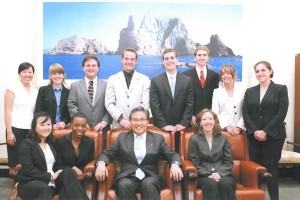While it can be easy to focus on missteps in the history of US foreign policy efforts, working at Meridian International Center has provided me with a window into the long legacy of successful public diplomacy opportunities we create throughout the years on behalf of the Department of State (DOS) and U.S. embassies abroad. For instance, only a handful of individuals have heard about “Jazz Diplomacy” during the Cold War era. Famous Jazz Ambassadors—Quincy Jones, Louis Armstrong, Dave Brubeck, Duke Ellington, Dizzy Gillespie, Benny Goodman, and numerous others—joined forces with the DOS to avert crisis indirectly. Even though the Jazz Ambassadors did not speak the local language and locals did not speak English (or agree with U.S. policy), they could understand each other through musical appreciation and inspiration. Yet most individuals nowadays only remember the Cuban Missile Crisis.
The journey of establishing the long legacy of successful public diplomacy has not been easy, since it is always built upon diligence and lengthy process to maintain deliberateness and maximize efficacy. First, DOS or U.S. embassies abroad write a request for proposal aimed at building professional or educational ties between the U.S. and selected communities abroad. After extensive research and preparations, Meridian’s GlobalConnect division submits a proposal in order to share an image of what the program might look like. By the time Meridian is selected, our staff is already invested in the topics the program will address and excited to begin planning.
In Meridian’s 50-year history of implementing such programs, there are countless examples projects that directly benefit the participants. The U.S. Congress-Korean National Assembly Exchange Program, for example, allows U.S. and Korea congressional staffers to exchange information and culture, thus strengthening U.S.-South Korea relations. This exchange program allows participants to build professional relationships on a personal level, both in the US and in South Korea. The resulting information-highway and goodwill between nations supports foreign policy goals, deepens the participants’ understanding of U.S./ Korea legislative processes, and helps participants to address common issues from different perspectives.
When the program is completed, it remains a long-term asset both to the U.S. and foreign countries. The participants of the U.S. Congress-Korean National Assembly Exchange Program bring their newly-acquired knowledge home and share it with family members, friends, and local communities. This enhances international and cross-cultural understanding.
Meridian has had the honor of implementing countless remarkable programs like the U.S. Congress-Korean National Assembly Exchange Program, and over the span of decades they have produced fruitful results. We can hope that the U.S. Congress-Korean National Assembly Exchange Program and other diplomatic efforts will continue to benefit the American public, advance U.S. foreign policy agenda, create partnership, and promote businesses.

















